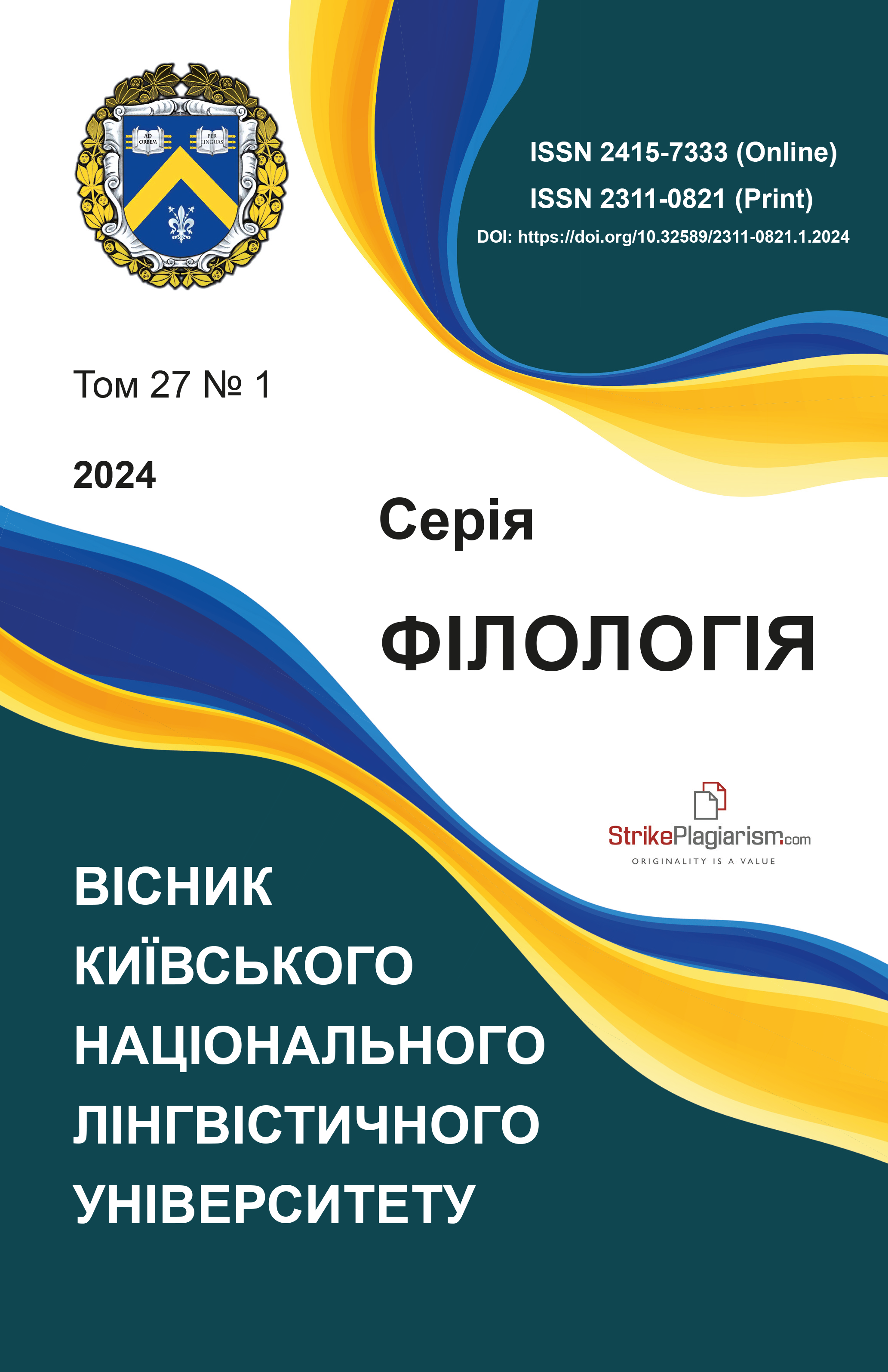Екзистенційні складники мотиву любові в малій прозі Галини Петросаняк (на матеріалі збірки “Не заважай мені рятувати світ”)
DOI:
https://doi.org/10.32589/2311-0821.1.2024.309632Ключові слова:
екзистенціалізм, мотив, оповідання-рефлексія, Галина Петросаняк, любов, екзистенційні потребиАнотація
У статті осмислено естетичну природу, художню специфіку екзистенційних складників мотиву любові, який став домінантою стильової манери малої прози Галини Петросаняк. Дослідження, побудоване на аналізі збірки «Не заважай мені рятувати світ», дало змогу пояснити сучасну трансформацію символіко-архетипної детермінанти загальнолюдського розуміння любові як найвищої цінності в усіх її виявах. Розглянуто авторську рецепцію мотиву любові в співвіднесенні із тлумаченням Е. Фромма людських екзистенційних потреб: у встановленні зав’язків, у подоланні себе, в усвідомленні людини в укоріненості, у самоідентичності, у будуванні життя в певній системі цінностей. Доведено, що, за письменницею, любов
є не механічною сумою регіональних, ментальних усних традицій, релігійних чеснот, а їхнє узагальнення в загальнолюдські реалії, що утворюють діалектичну єдність світоглядних, соціально-психологічних, естетичних принципів гармонійного життя людини. І в рецепції авторки ця константа частіше виявляється в межових ситуаціях відчаю, зневіри, у яких опиняються герої її оповідань. Письменниця в образотворенні прагне поєднати часто опозиційні істини багатьох людей, націй, культур, релігій, філософських поглядів з метою підкреслити значущість цього почуття в бутті
людини для визначення власного вибору, який дозволяє особистості вийти з психологічної кризи. Заявлена в статті тема невичерпна й багатоаспектна, яка здатна спродукувати різноманітні літературознавчі, культурологічні, філософські дискусії. Це дослідження допоможе поглибити уявлення про авторський індивідуальний стиль сучасної української письменниці, бо він увібрав у себе як людські риси самої авторки, так і головні риси нашої доби. Саме в цей період художня література як мистецтво відіграє вирішальну роль у збереженні мови, духовності, національної
самобутності і буде завжди перспективною в літературознавчому дискурсі.
Посилання
Боднар, О. (2011). Екзистенційні мотиви у творчості Тараса Шевченка і Валерія
Шевчука. Шевченкознавчі студії, 14, 142-147.
https://www.irbis-nbuv.gov.ua/cgi-bin/irbis_nbuv/cgiirbis_64.exe?I21DBN=LINK&P
DBN=UJRN&Z21ID=&S21REF=10&S21CNR=20&S21STN=1&S21FMT=ASP_
meta&C21COM=S&2_S21P03=FILA=&2_S21STR=Shs_2011_14_20.
Гайдеґґер, М. (2011). Дорогою до мови. Літопис.
Дем’яненко, В. (2011). Ясперс Карл Теодор. Політична енциклопедія. 678.
Парламентське видавництво.
Деркач, Ж. В. (2015). Екзистенційні мотиви в творчості Михайла Коцюбинського.
Вісник Черкаського університету. Серія “Філософія”, 11, 89–94.
https://www.irbis-nbuv.gov.ua/cgi-bin/irbis_nbuv/cgiirbis_64.exe?I21DBN=LINK&P
DBN=UJRN&Z21ID=&S21REF=10&S21CNR=20&S21STN=1&S21FMT=ASP_
meta&C21COM=S&2_S21P03=FILA=&2_S21STR=VchuFil_2015_11_16
Іванишин, П. (2003). Національно-екзистенційна методологія: герменевтична
актуалізація. Слово і час, 4, 33-45.
Ковалів, Ю. І. (2007). Екзистенціалізм. Літературознавча енциклопедія : у 2 т. Т. 1,
ВЦ “Академія”.
Малиновський, Р. (2024). Галина Петросаняк: “Сенс життя в тому, що ми щось
повсякчас переписуємо”.
https://postimpreza.org/talsk/halyna-petrosaniak
Михайловська, Ю. (1998). Трагічні оптимісти. Екзистенційне філософствування в
українській літературі ХІХ – першої половини ХХ ст. Літопис.
Петросаняк, Г. (2023). Не заважай мені рятувати світ. Дискурсус.
Сартр, Ж.-П. (2002). Екзистенціалістська модель в теорії літератури. Дискурсус,
Дискурс, Слово. Знак. Дискурс: Антологія світ, літ.-крит. думки XX ст. 324–326.
Літопис.
Фромм, Е. (2017). Мистецтво любові. “КСД”.
Шинкарук, В. І. (2002). К’єркегор Сьорен. Філософський енциклопедичний словник.
–279. Абрис.
Ящук, Ж. М. (1998) Екзистенційність як художньо-естетичний метод в українській
літературі ХХ ст. [Автореф. дис. канд. філос. наук, Київський університет
ім. Тараса Шевченка]. Інституційний репозитарій Київського національного
університету ім. Тараса Шевченка.
##submission.downloads##
Опубліковано
Номер
Розділ
Ліцензія
1. Дослідження, що публікуються у збірнику наукових праць, повинні бути виконані відповідно до чинного законодавства України та етичних норм. Основний обов’язок автора полягає в тому, щоб виконати таке дослідження, яке заслуговує на об’єктивне обговорення науковою спільнотою його значущості.
2. Автори повинні формулювати свої наукові спостереження у такий спосіб, щоб їхні результати могли бути підтверджені іншими вченими, без підробки отриманих висновків або маніпуляції ними.
3. Автори статей несуть відповідальність за зміст статей і за сам факт їх публікації.
4. Автор повинен цитувати ті публікації, які вплинули на сутність роботи, а також ті, які можуть швидко познайомити читача з попередніми роботами, важливими для розуміння цього дослідження. За винятком оглядів, слід мінімізувати цитування робіт, які не мають безпосереднього відношення до змісту дослідження. Автор зобов’язаний провести джерельний пошук, щоб знайти і процитувати оригінальні публікації, тісно пов’язані з цим матеріалом. Необхідно також коректно вказувати на джерела принципово важливих матеріалів, використаних у цій роботі, якщо вони не були отримані самим автором.
5. Автори повинні дотримуватися усіх чинних вимог щодо публікацій рукописів. Неприпустимим є плагіат та його удавання за оригінальну розвідку, а також подання до редакції раніше опублікованої статті. У випадках виявлення плагіату відповідальність несуть автори поданих матеріалів.
6. Експериментальне або теоретичне дослідження може іноді слугувати основою для науково коректної і об’єктивної критики роботи іншого дослідника. Опубліковані статті в окремих випадках можуть містити подібну критику. Персональна суб’єктивна критика не є доречною за жодних обставин.
7. Співавторами статті мають бути ті особи, науковий внесок яких є вагомим у її зміст та які розділяють відповідальність за здобуті результати. Автор, який подає рукопис до друку, відповідає за те, щоб до списку співавторів були включені всі ті й лише ті особи, які відповідають критеріям авторства. У статті, написаної декількома авторами, той з авторів, хто подає до редакції контактні відомості, документи і листується з редакторами, бере на себе відповідальність за згоду інших авторів статті на її публікацію у збірнику.
8. Автори повинні повідомити редактора про будь-який потенційний конфлікт інтересів, на які могла б вплинути публікація результатів, що містяться у рукописі.
9. Автори повинні чітко вказати джерела всієї процитованої інформації, оформити посилання на наукові джерела відповідно до вимог ДСТУ ГОСТ 7.1:2006.
10. Редколегія має право відмовити у публікації статті за умов недотримання зазначених вимог.
11. Автор може висловити побажання не залучати деяких рецензентів до розгляду рукопису. Проте головний редактор може прийняти рішення залучити одного або декількох із цих рецензентів, якщо переконаний, що їх думки є важливими для неупередженого розгляду рукопису. Таке рішення може бути прийняте, наприклад, у тому випадку, коли є серйозні суперечності між цим рукописом і попередньою роботою потенційного рецензента.
12. Запобігання псевдонауковим публікаціям є відповідальністю кожного автора, головного редактора, рецензента, видавця й організації.


